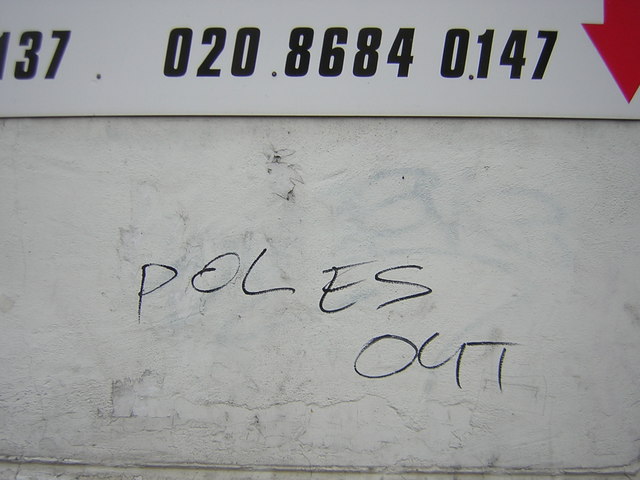By Daniel Tilles
A notable feature of the growing anti-immigration rhetoric in British political discourse in recent years has been the specific criticism directed against Poles. Prime Minister David Cameron, in his campaign against the alleged exploitation of the UK’s social-welfare system by immigrants, has explicitly used Poles to personify the problem. The leader of the main opposition party, Ed Miliband (ironically himself the son of emigrants from Poland), has claimed that “Polish immigration in particular” is “driving down living standards” for British people. Jack Straw, who was foreign secretary from 2001 until 2006, recently admitted that the decision his government made to allow unlimited immigration from “states like Poland” was a “spectacular mistake”.
Being singled out in this way has understandably left many Poles, both in the UK and back at home, feeling rather uncomfortable. Complaints have been aired by Polish government ministers and sections of the media, while in February last year hundreds of members of the UK’s Polish community gathered outside the prime minister’s residence to protest against discrimination. Unfortunately, the situation is only going to get worse in the immediate future, with campaigning for May’s general election already dominated by the question of immigration. The three main political parties are competing with one another to present the toughest stance on the issue, while the election is likely to confirm the political breakthrough of the populist UK Independence Party (UKIP), which aims to dramatically reduce immigration.
While the following months may, therefore, be hard to endure, Polish frustration should be tempered by one fact: this is nothing personal. Although Poles are the target of this anti-immigration rhetoric, it is not really about them at all; rather, they have become unwitting victims of a complex set of contemporary and historical anxieties felt by the British people.
Model immigrants
It is worth noting, first of all, that, despite the hostile political pronouncements, angry newspaper headlines and opinion polls showing widespread opposition to immigration, the British people actually have a far more nuanced – and often positive – attitude towards the Poles who live among them. On a cultural level, there is a feeling of affinity – and certainly a sense that Poles are more compatible and desirable than many other groups of immigrants. This sympathetic sentiment has often been manifest in places one would more often find hostility towards immigration. The chairman of the pressure group MigrationWatch, Andrew Green, while advocating an overall “reduction in numbers” of immigrants, declared that he has “no problem with immigration from Poland”.
A columnist for the Daily Telegraph, a conservative daily, remarked last year how Poles “work hard”, “like a beer”, and “go to church” – making them “pretty close to the ideal way of life cherished by a lot of British people”. He also highlighted the two countries’ shared history and, in particular, “how much we owe the Poles who flew for the RAF during the Battle of Britain”. (As a further bonus, he added, the Poles “make a damn good sausage too”!) The Spectator, another conservative publication, praised Polish immigrants as “hard-working, presentable, well-educated, and integrat[ing]…perfectly”.
In addition to this cultural connection, there is also an appreciation of the contribution that Poles make to the economy. A survey last year found that a majority of Britons believe Polish immigrants “work hard for a living” (55%) and “make a contribution to Britain” (52%), while only 24% thought they did not contribute. Another poll, taken in 2013, similarly found those who believe Poles make a positive contribution (38%) outweighing those who thought the opposite (29%). When official statistics were recently released revealing that Poles have the highest rate of employment (81.2%) of any national group in the UK, they were widely (and approvingly) reported in the media. It was often noted that this figure is far higher than among native Britons (69%) and non-EU immigrants (59%).
If Poles are popular on a personal level, and their contribution to society is appreciated, what explains the current hostility they are facing? The answer to this contradiction lies deep in the British psyche. In particular, Poles, through no fault of their own, have come to embody two abstract notions that the British people have always found troubling
“The Polish paradox”
The first is immigration itself. Throughout history Britons have been able to express tolerance towards immigrants as individuals while simultaneously exhibiting hostility towards the idea of immigration as a whole. Every wave of mass migration to Britain – the Irish in the mid-19th century, East European Jews at the turn of the 20th century, Asians and West Indians from the crumbling British Empire after the Second World War – has been met with fears of the country being flooded by outsiders, threatening to swamp the indigenous culture and deprive natives of work. Yet at a more mundane, everyday level, each of these groups has quickly been accepted into their local communities, who have come to appreciate the positive contribution they make to British culture and the economy. In short, Britons dislike immigration in theory, but actually quite like it in practice.
These contradictory attitudes were illustrated in the 1930s, when, at a time of heightened antisemitism, the leaders of the Jewish community commissioned a study of public attitudes towards Jews. Among members of the public surveyed, the overriding sentiment was that, while they did not like the abstract notion of “Jewish immigration”, they felt positively towards the individual Jewish immigrants they came into contact with. One respondent, picked out by the researchers as being highly typical, commented that “personally I have three Jewish friends who are great friends to me and whom I like very much; I have nothing against them, but only against the [Jewish] race as a whole…We have quite enough Jews in the country as it is and we do not want any more”.
The negative side of such sentiment has often had tangible and unpleasant consequences for immigrants. From the late 19th century a popular “anti-alien” movement arose against Jewish immigration. Politicians, like today, pandered to these public fears. In the 1920s, the home secretary expressed his fear of an “England flooded with the whole of the alien refuse from every country in the world”, while the prime minister promised that “no alien should be substituted for one of our people”. During this period the British parliament passed the country’s first ever laws designed to restrict entry to the country, known as the Aliens Acts.
The post-war wave of immigration from Asia and the Caribbean inspired similar concerns. This was most famously expressed in 1968 by a member of the Conservative shadow cabinet, Enoch Powell, whose “Rivers of Blood” speech warned that Britain was being “changed beyond recognition” by this flood of immigrants. Their refusal to integrate, and the competition they created for economic and social resources, would inevitably lead to conflict, he predicted, which could only be averted by severely restricting the number of arrivals.
Yet Powell’s dire prophecies, and those of the earlier anti-alien campaigners, never came to pass. Each group of immigrants, despite initial hostility, quickly came to achieve acceptance and integration. You would find few people today who regarded British-born Indians or Jews as any less British than the native English, Scots or Welsh. This is the case even among those who oppose immigration. The leader of UKIP, Nigel Farage, is a self-confessed admirer of Enoch Powell; yet his party is putting forward around 40 black and Asian electoral candidates, whom Farage applauded last year for “their united belief in being British”.
Moreover, while immigrants have certainly changed the country, they have done so in a way that Britons largely approve of, contributing to the development of the diverse, dynamic culture in which most people take great pride. For a superficial but telling example one need only look at the national cuisine. Fish and chips, today regarded as quintessentially British, was actually created and popularised by Jewish immigrants during the 19th century. More recently, chicken tikka masala – a curry invented at Indian restaurants in the UK to suit the British palate – has come to be regarded as Britain’s unofficial national dish (an estimated 18 tonnes of it is eaten every week in the UK).
A recent poll found that 70% of Britons approve of multiculturalism. Yet the very same survey also revealed that a majority (54%) believe immigration to have been a bad thing for the UK. Once again, we see the contrast between hostility towards the abstract idea of immigration and positive sentiment towards its actual consequences.
It is into this context that Polish immigrants have arrived. As the largest national group among post-2004 arrivals, they have come to represent the latest wave of immigration to Britain. Reaction to them has conformed to the historical pattern, with a contrast between people’s positive everyday experience of Poles in the UK – the hardworking builders who renovated their house, the doctors and nurses without whom the local hospital would struggle to function, the new Polish deli offering a great range of cold meats – and their abstract notion of a flood of immigrants threatening the British way of life. This is what the Economist newspaper referred to last year as the “Polish paradox”, quoting one Briton who said that, when it comes to the Poles, “it’s not the migrants I don’t like, it’s the migration”.
Eurosceptic fears
In addition, Poles have come to personify another British bugbear: the European Union. Britons have traditionally been the most Eurosceptic nation in the EU (although the recent Eurozone crisis has created some challengers for this title). Such is the strength of feeling that David Cameron has promised, if his party is reelected this year, to hold a referendum on EU membership by 2017, giving the British people a direct choice between remaining in the Union and leaving it.
Yet, once again, we see that this outward hostility masks a more complex relationship. Exactly as with immigration, Britons enjoy the specific benefits brought by EU membership – access to the single market, cheap and easy travel to the continent, consumer protections, monopoly busting – but dislike the abstract notion of ceding their sovereignty to Brussels. A significant feature of the latter fear is the idea that Britain has lost control of its borders and social-welfare system, theoretically allowing the whole of Europe to turn up on Britain’s doorstep and start claiming benefits. This was apparent in the breathless tabloid headlines in 2013 warning that 30 million Romanians and Bulgarians – the entire population of the two countries – would be able to flood into the UK once the labour market opened up to them in January 2014, and in the regular scare stories accusing EU immigrants of exploiting Britain’s generous welfare system.
Such stories usually have little basis in fact. There was no sudden influx of immigrants in 2014: in fact, over the first three months of the year the number of Romanians and Bulgarians in the UK actually fell. And numerous studies have shown that “benefit tourism” is largely a myth: only a tiny fraction of EU immigrants come to the UK to claim benefits rather than work, and overall they have paid more in taxes than the value of government services they have used.
But the reality is not what matters. The mere fact that it is theoretically possible for all 500 million EU citizens to move to the UK, and for them to gain access to its benefit system, is enough to cause great fear among Britons, and to remind them of the fact that EU membership has left them with less control over their own country. And because, when there actually was a mass wave of immigration after the EU expanded in 2004, Poles were by far the largest group among the new arrivals, it is they who have come to personify in British minds the problems caused by EU membership.
Pierogi masala?
In the immediate future, Poles will continue to be negatively associated with the alleged ills of mass immigration and EU membership. But the good news is that in the longer term the situation will improve.
Within the next few years Britain’s relationship with the EU will be clarified one way or another. More than likely it will choose to remain in the club. Already, the prospect of leaving the EU is causing Britons to reconsider the merits of membership: before David Cameron announced his plans to hold a referendum, polls showed that Britons wanted to leave the EU by a margin of 4-8%; since his announcement, they now favour retaining membership by a margin of 17-20%. Once again, we see how, when they are asked to consider practical realities rather than abstract fears, Britons are capable of thinking rationally about the benefits.
Meanwhile, over time, as Poles become more established and integrated, they will cease to be so strongly associated in British minds with the perceived dangers of mass immigration, and will be welcomed into the UK’s ever-evolving multicultural experiment. Do not be surprised if, in 50 years’ time, an Anglicised version of pierogi is celebrated, alongside fish and chips and chicken tikka masala, as a great British dish.
Main image credit: Christopher Hilton (under CC BY-SA 2.0)

Daniel Tilles is editor-in-chief of Notes from Poland. He has written on Polish affairs for a wide range of publications, including Foreign Policy, POLITICO Europe, EUobserver and Dziennik Gazeta Prawna.




















